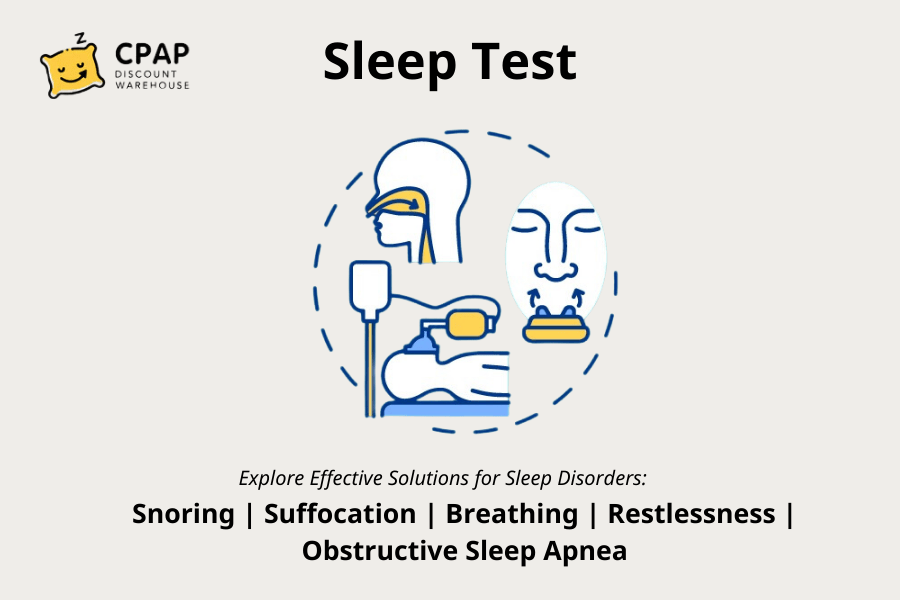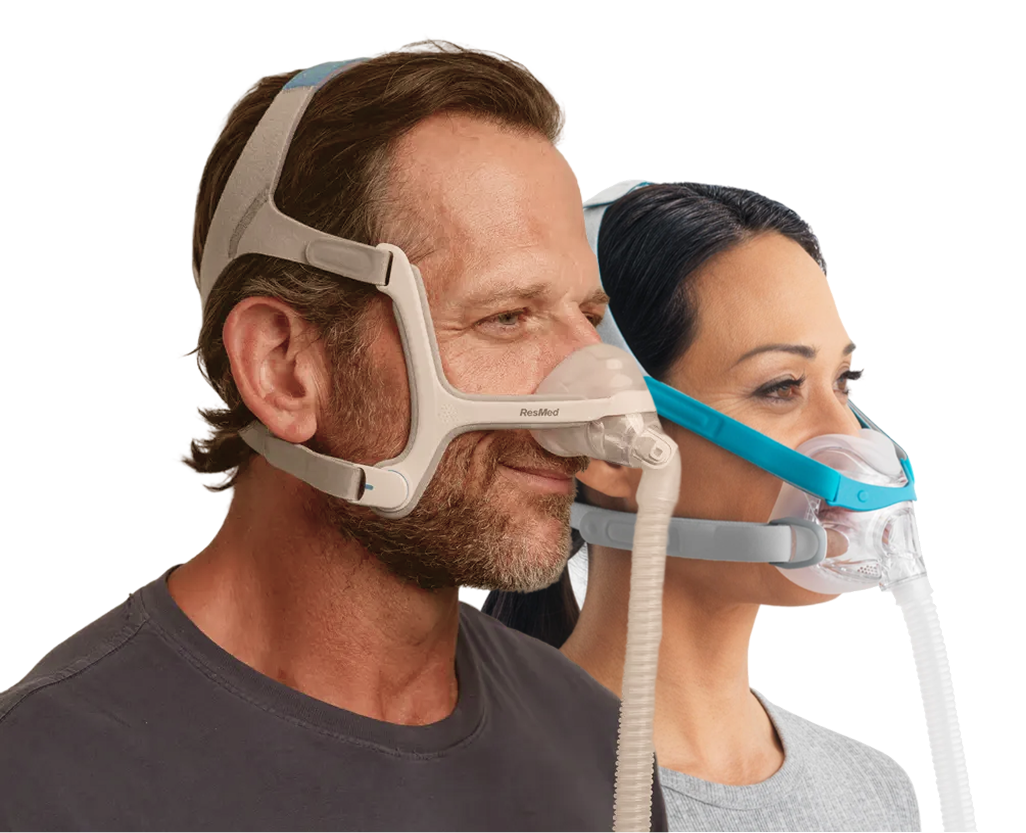The sleep apnea test monitors vital functions during sleep to diagnose sleep apnea, a serious disorder that causes repeated breathing interruptions. This test tracks heart rate, breathing patterns, and oxygen levels, aiding in early detection. Identifying sleep apnea early can help prevent complications such as heart disease, stroke, and persistent fatigue. Learn more about the test procedure and its importance for healthy sleep in the CPAP Discount Warehouse article below.
Tests for Sleep Apnea
Sleep apnea tests are categorized into two primary types, each serving distinct diagnostic purposes:
1. Level 3 Sleep Study (Home Sleep Apnea Test – HSAT)
A Level 3 sleep study, or Home Sleep Apnea Test (HSAT), allows sleep assessment at home. This test records breathing, oxygen levels, and heart rate. It helps diagnose obstructive sleep apnea by analyzing airflow and snoring patterns. Unlike lab-based tests, HSAT provides convenience but offers limited data.
It is ideal for those suspected of sleep apnea without additional sleep disorders. While effective for apnea detection, it may not identify other sleep conditions. Healthcare providers often use HSAT as an initial screening tool before recommending more detailed evaluations if necessary.
2. Level 2 Sleep Study (Polysomnography – At Home or Lab)
A Level 2 sleep study, or polysomnography, records breathing, oxygen levels, heart rate, brain activity, and muscle movements. It can be performed at home or in a sleep lab. This test provides a detailed analysis of sleep patterns and detects conditions like periodic limb movement disorder (PLMD).
It is recommended for those with persistent sleep disturbances when the cause is unclear. Unlike HSAT, it captures more sleep-related data, making it useful for diagnosing multiple conditions. Patients experiencing poor sleep without obvious apnea symptoms may benefit from this study.
3. Level 1 Sleep Study (Polysomnography – In-Lab Only)
A Level 1 sleep study is an in-lab polysomnography performed under continuous supervision by a Registered Polysomnographic Technologist (RPSGT). It tracks brain waves, breathing, muscle activity, and heart rate in real time. This study helps diagnose REM Sleep Behavior Disorder and other complex sleep conditions. Unlike home-based studies, it ensures accurate results through professional monitoring.
It is ideal for individuals with unexplained sleep disturbances or suspected neurological disorders. Since it requires overnight observation, patients should be comfortable sleeping in a clinical setting. This test provides the most comprehensive sleep evaluation.

Other Tests for Sleep Apnea
In addition to standard sleep apnea tests, several other assessments may be used. These assessments help gather more detailed information about sleep patterns and related conditions.
-
EEG (Electroencephalogram): Measures and records brain wave activity to analyze sleep stages.
-
EMG (Electromyogram): Monitors muscle activity, including facial twitches, teeth grinding, and leg movements. It also helps identify REM sleep, the stage associated with intense dreaming.
-
EOG (Electrooculogram): Tracks eye movements to determine sleep stages, particularly REM sleep.
-
EKG (Electrocardiogram): Records heart rate and rhythm to detect any irregularities as you fall asleep
-
Nasal Airflow Sensor: Measures airflow to identify breathing interruptions.
-
Snore Microphone: Captures snoring patterns to assess airway obstruction.

Sleep apnea questionnaire
How can I check myself for sleep apnea? Take our quick Sleep Quiz to find out if a sleep study is right for you. It only takes a few minutes and could be the first step to better sleep and health.
What does my result mean?
Results:
+ 0-5 below average daytime tiredness
+ 6-10 normal daytime tiredness
+ 11-12 mild daytime tiredness
+ 13-15 moderate daytime tiredness
+ 16-24 severe daytime tiredness
There are many reasons why you might feel tired during the day. Some common causes of sleepiness are:
+ Lack of sleep
+ Unhealthy lifestyle, such as poor diet or lack of exercise
+ Stress, illness, or side effects of certain medications
+ Hormonal changes, such as puberty, pregnancy, or menopause.
A total score between 11 and 24 may mean that you suffer from unusual sleepiness during the day.

Sleep Study Results
The sleep report provide essential insights into the presence and severity of sleep-related breathing disorders. Here’s what they typically indicate:
| Apnea-Hypopnea Index (AHI) |
Normal: AHI < 5 Mild Sleep Apnea: AHI 5–15 Moderate Sleep Apnea: AHI 15–30 Severe Sleep Apnea: AHI > 30 |
| Oxygen Levels (SpO2) |
Normal: 95%–100% Below 90%: May signal significant respiratory issues. |
| Airflow |
Reduced or paused airflow may indicate apnea (complete blockage) or hypopnea (shallow breathing) |
| Breathing Effort |
Continued effort with no airflow: Suggests diagnose obstructive sleep apnea. No breathing effort: Suggests central sleep apnea. |
| Heart Rate |
Irregularities may indicate stress on the heart caused by apnea episodes. |
| Snoring |
Frequent or loud snoring often correlates with apnea or hypopnea events. |
| Sleep Position |
Sleeping on the back can worsen apnea symptoms due to airway collapse. |
| Sleep Stages |
Frequent awakenings or imbalances in sleep stages suggest poor sleep quality caused by apnea. |

Sleep Study Results. Source: dentalsleepmed.gr
>>> Overiew Apnea Definition & Meaning
How much does a sleep apnea test cost?
On average, sleep studies at a hospital or sleep lab cost between $500 and $1,000. If you have a valid Medicare card, you may be eligible for partial or full reimbursement for the cost of the sleep study. This includes the cost of accommodation and use of equipment.
The cost varies depending on the location you choose. The price also depends on the duration of the planned study and whether you have health insurance.
Sleep studies conducted at home are more economical and cost between $149 and $400. Some health insurance plans may cover these costs.
The price difference varies, but considering the maximum cost of $1,000 in a laboratory and the maximum cost of $400 for home testing, the difference is $600.
FAQs
Where do I find sleep apnea test bulk billed?
Changing your lifestyle to improve your heart health is the first step in treating metabolic syndrome. You may need to consult a dietitian and physical therapist to identify the diet and exercise program that best suits your needs. If lifestyle changes do not produce results, medication or surgery may be necessary to reduce weight.
Do you need a doctor referral for sleep apnea test?
Yes, a referral from the treating physician is required, stating that the patient is at high risk of developing a sleep disorder called obstructive sleep apnea (OSA).
Can a sleep apnea test be wrong?
The probability of a misdiagnosis in people with OSA based on data from a single night ranged from 20% to 50%. The error rate of misdiagnoses decreased as the number of nights of observation increased (e.g., F1 index for 1 night = 0.77 vs.
Conclusion
Sleep apnea testing is essential for diagnosing sleep apnea and related disorders. These tests give important information about breathing patterns, oxygen levels, heart rate, and sleep quality. This helps healthcare professionals understand how serious the condition is and create a good treatment plan.
At CLM Sleep – Sleep Clinic, we specialise in expert diagnosis and treatment for sleep disorders. Our clinics are located in Perth, Melbourne, Adelaide, and across Australia, offering personalised care and support throughout your treatment journey. We also work in partnership with CPAP Discount Warehouse, providing a wide range of CPAP machines and accessories to ensure effective therapy.






